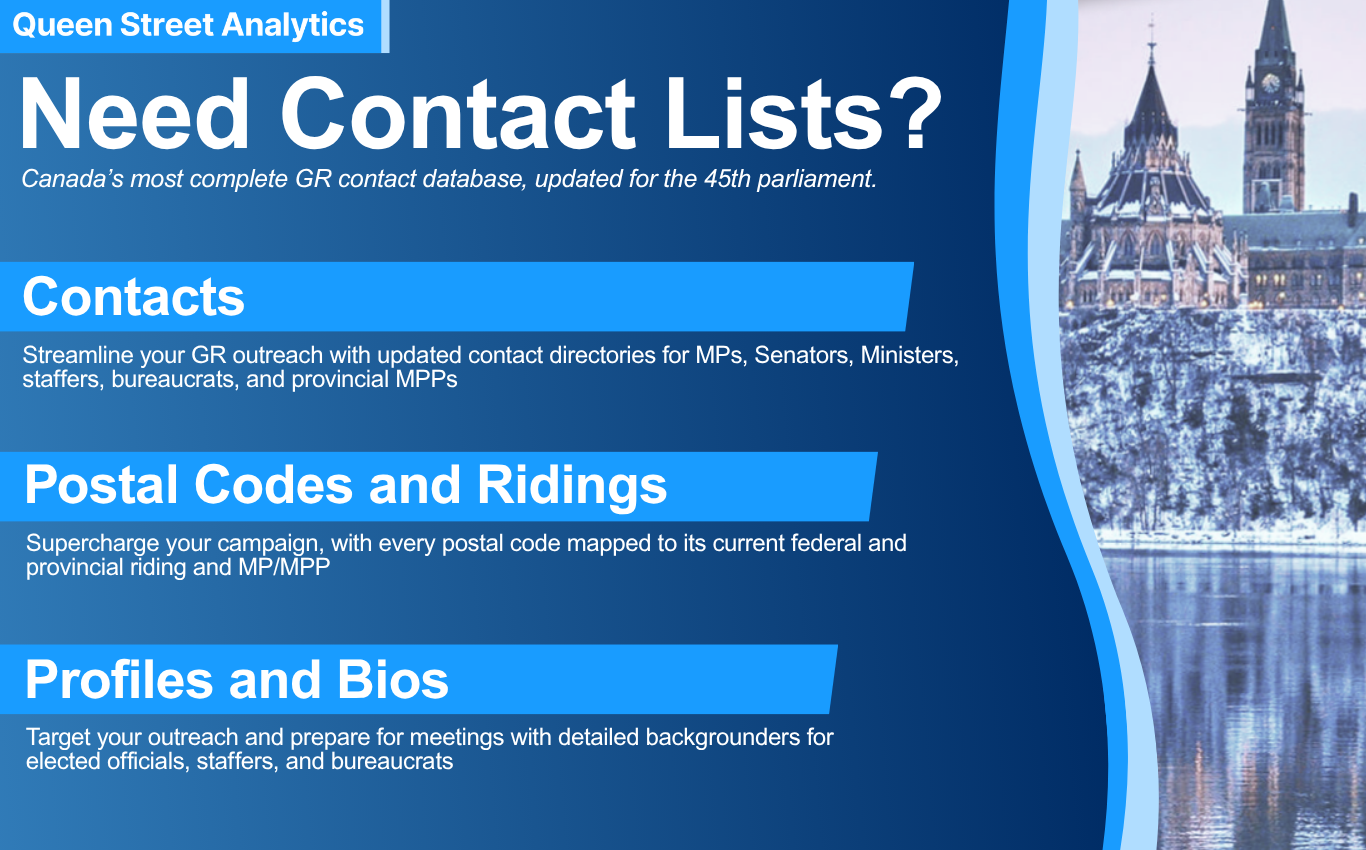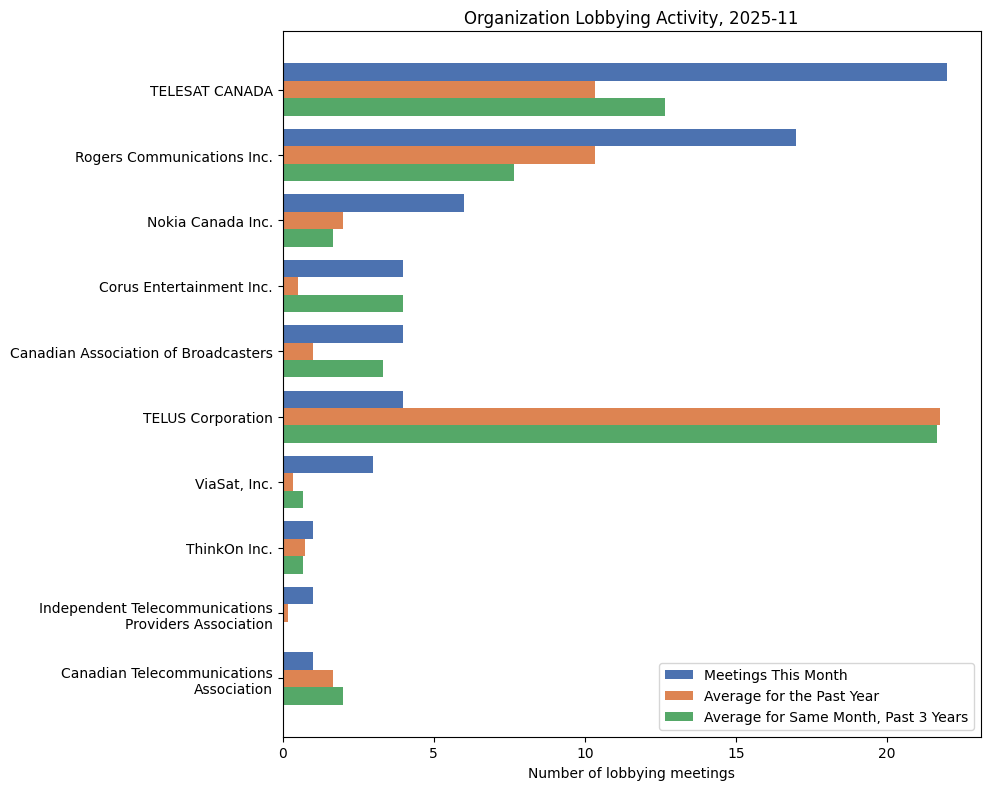QSA's Week in Telecoms (#38, 2025)
CRTC addresses connectivity and affordability; Canada launches new AI strategy sprint; Competition Bureau Summit upcoming; FCC updates broadband, consumer protection rules; TikTok secures US operational deal.

Good morning! This is Queen Street Analytics' weekly roundup of regulatory developments, legislative discussions, political announcements and other government-related news concerning cellphone and wireless carriers, ISPs, satellite communications, broadband access, 5G, remote communities, and CRTC spectrum licences. Every Monday, we break down the most important updates in this space in under five minutes.
Want to track other GR news in adjacent industries? Don’t miss this week’s updates in ICT & Cybersecurity and Utilities & Power.
Dates: 2025-09-21 to 2025-09-27
📋 In This Week's Newsletter
• 🇨🇦 Canadian Federal GR News
• 🇺🇸 US Federal GR News
• 🗺️ Canadian Provincial GR News
• 📚 What We're Reading This Week
Canadian Federal GR News
CRTC Outlines Measures for Modernizing Broadcasting and Telecom Policy
Vicky Eatrides, Chairperson of the Canadian Radio-television and Telecommunications Commission (CRTC), appeared before the Standing Committee on Industry and Technology to discuss the CRTC’s current initiatives. Eatrides emphasized the implementation of the amended Broadcasting Act, focusing on ensuring online streaming services contribute an estimated $200 million annually towards local news, French-language, and Indigenous content. Decisions under the new framework target immediate funding needs in broadcasting. On the telecommunications front, she described new policies enabling competitors to use incumbent networks for both internet and cellular services, citing a 16.7% decline in mobile service prices between 2023 and 2024 based on Statistics Canada data. The CRTC continues to manage broadband fund allocations, with over $750 million directed to projects serving nearly 50,000 homes in more than 290 communities. Future regulatory action areas include international roaming, telecom outages, and consumer protection—with four ongoing public proceedings designed to limit unexpected bill increases and simplify service switching procedures.
Sources: Announcements: www.canada.ca

Government of Canada Launches AI Strategy Task Force and National Engagement Sprint
On September 26, 2025, Minister Evan Solomon announced the formation of an AI Strategy Task Force along with a 30-day national public engagement campaign to inform Canada’s next AI strategy. The initiative seeks feedback from industry, academia, and civil society on several themes, including research, talent development, AI adoption by industry and government, infrastructure, commercialization, public trust, and security. Stakeholders are invited to submit input via the Consulting Canadians portal through October. Task Force members include representatives from the University of British Columbia, CGI Canada, Moov.AI, Coveo, Inovia Capital, Council of Canadian Innovators, Cohere, First Nations Technology Council, VDRUA, Aptum, and others. Findings from consultations are scheduled for release in November, with the government aiming to position Canada at the forefront of AI innovation and digital infrastructure.
Sources: Announcements: www.canada.ca
Canada’s Competition Summit 2025 Will Address Market Structure and Innovation
The Competition Bureau will host Canada’s Competition Summit 2025 in Ottawa on October 1, bringing together policy makers, industry leaders, and experts to address competition’s role in affordability and economic resilience. Scheduled speakers include Mélanie Joly, Minister of Industry, and Carolyn Rogers, Senior Deputy Governor of the Bank of Canada. The agenda features sessions on actionable strategies for stimulating innovation and lowering costs in markets, with opportunities for virtual attendance. The Summit intends to discuss domestic and global best practices amid a transforming Canadian economy and evolving competitive dynamics.
Sources: Announcements: www.canada.ca
Senate Sitting Addresses Broadcasting Act Privacy, SME Support, and Trusted Traveler Program
On September 24, the Canadian Senate, during sitting no. 18, raised several issues affecting communications and digital infrastructure. Senator Pierre Moreau addressed questions on privacy protection measures within the Broadcasting Act, referencing transparency and implementation of safeguards. Additional topics included energy project approvals, support for small and medium-sized enterprises (SMEs), and public confidence in government services. Senator Paula Simons proposed a motion advocating a verified travelers program to address inefficiencies in airport security, citing persistent difficulties in NEXUS card acquisition and calling for a Canadian solution to streamline traveler clearance processes. The Senate also passed motions authorizing various committee studies relating to digital policy, while Senator Leo Housakos questioned government housing policies.
Sources: Transcripts: senparlvu.parl.gc.ca
US Federal GR News
FCC Spring 2025 Regulatory Agenda Targets Broadband, Consumer Protection, and Spectrum Management
The Federal Communications Commission (FCC) released its semiannual regulatory agenda detailing active proceedings across bureaus including broadband expansion, spectrum allocation for next-generation technologies, and consumer protection. Key regulatory actions target implementation of the Telephone Consumer Protection Act to address robocalls and text message fraud. Efforts to expand 5G coverage, especially in rural regions, continue through updated spectrum management and Broadband Data Collection initiatives. Additional rulemakings address media ownership, standards for broadcast television, 911 service enhancements, wireless emergency alert systems, and cybersecurity controls for connected devices and public safety infrastructure. Space and satellite communication rules are also under review, with an emphasis on orbital debris mitigation and non-geostationary systems. Programs to promote universal service and digital equity, especially in underserved areas, are advancing alongside updates to equipment authorization processes.
Sources: U.S. Federal Announcements: www.federalregister.gov
FCC Seeks Comments on Extended Robocall Traceback and Call Authentication Procedures
The FCC issued a notice on September 23 inviting public input for continued information collection requirements under the Paperwork Reduction Act as part of its advanced robocall mitigation efforts. Subject providers must respond to traceback requests within 24 hours, implement mandatory call blocking for illegal robocalls, and enforce due diligence on upstream providers. The requirements—covering 6,493 respondents collectively—are designed to counter foreign-originated unlawful robocalls and support effective enforcement. All compliance responses are due by November 24, 2025, with strict definitions for business hours and reporting timelines. The initiative draws authority from the Communications Act of 1934 and seeks to ensure providers adhere to mitigation steps in collaboration with FCC enforcement activities.
Sources: U.S. Federal Announcements: www.federalregister.gov
FCC Requests Review of Broadband and Voice Competition Survey, FCC Form 477
On September 25, the FCC published a request for comments regarding the extension of FCC Form 477, which collects data on broadband and voice subscribership as well as broadband service availability. With 3,400 respondents and 6,800 responses anticipated, the collection informs policymaking on universal service obligations and market competition as required under the Telecommunications Act of 1996. The aggregated data supports regulatory decisions on network deployment, competitive dynamics, and identifies gaps in broadband coverage. The Commission leverages the information to prepare consumer-facing reports and guide rulemaking processes at the federal and state levels.
Sources: U.S. Federal Announcements: www.federalregister.gov
FCC Submits Extension Requests for Notifications on Maritime and Cable Services
The FCC signaled intent to extend information collections associated with Section 80.409 (Maritime Station Logs), Section 76.1618 (Basic Tier Cable Service Notification), and FCC Form 1205 (Cable Equipment and Installation Rates). These requirements impact public coast and ship stations, cable operators, and local franchising authorities. Annual reporting and recordkeeping obligations remain unchanged, covering operational logs, service notifications, and cost determinations. Amendments to cable equipment regulation were finalized in July 2025, with Form 1205 filings reduced in scope as regulation of non-basic tier equipment was excluded. Interested parties are invited to comment by October 24, 2025.
Sources: U.S. Federal Announcements: www.federalregister.gov
President Trump Signs Executive Order Securing TikTok's US Operations
On September 25, President Donald J. Trump formalized an executive order enabling TikTok to continue operations in the United States while addressing national security risks. The agreement results in a new U.S.-based joint venture, with majority ownership by U.S. investors and oversight from a board specifying national security expertise. ByteDance retains less than 20% ownership, with operational restrictions on board involvement. Oracle is assigned as the security provider to enforce U.S.-based data hosting and algorithm surveillance. The arrangement aligns with the Protecting Americans from Foreign Adversary Controlled Applications Act, removing Chinese control and projecting $178 billion in economic impact over the next four years for American creators and businesses.
Sources: White House Announcements: www.whitehouse.gov
Canadian Provincial GR News
Alberta Hosts FPT Symposium on Digital Trust and Cyber Security
Provincial, federal, and territorial ministers met in Kananaskis, Alberta, to finalize a multilateral agreement on real-time cybersecurity intelligence sharing to defend Canadian critical infrastructure.
Sources: Provincial Announcement: www.alberta.ca
New Brunswick Partners with Bell to Expand Rural Cellular Coverage
The Government of New Brunswick announced a partnership with Bell Canada to deploy new cellular sites using government communications towers, with initial sites commencing build-out in 2026 for completion by mid-2027.
Sources: Provincial Announcement: www2.gnb.ca
Nova Scotia Introduces Modernized Access and Privacy Legislation
Nova Scotia tabled a new Freedom of Information and Protection of Privacy (FOIPOP) Act, consolidating related statutes and expanding privacy oversight to municipalities and villages, effective April 1, 2027.
Sources: Provincial Announcement: news.novascotia.ca
What We're Reading This Week
- Starlink sets sights on delivering direct-to-consumer satellite phone service: Starlink announces plans to offer direct satellite phone service to Canadian consumers.
- Secret Service dismantles telecom threat around UN capable of crippling cell service in NYC: Authorities neutralize cybersecurity risk that could impact wireless networks during UN meetings.
- Ottawa planning ‘refreshed’ AI strategy, data protection bill: Ottawa is preparing a new AI strategy and data protection legislation.
- Erin O'Toole: When the lights go out — a warning about cyber risks: Erin O’Toole discusses cyber threats to Canada’s digital infrastructure.
- No more secrets: Head of OLG’s cybersecurity on why all firms must work together to fight digital bad actors: OLG’s cybersecurity chief calls for unified action against online fraud.
- Barry Appleton: Canada has become a nation of digital sharecroppers: Barry Appleton raises concerns over Canada’s digital dependency.
- Ottawa to prioritize tech with civilian and defence applications in new strategy: Ottawa plans new policy for technology with dual civilian/defence value.

